BEST PRACTICE PROJECTS FOR PEOPLE FROM VULNERABLE GROUPS
In our last subchapter we present projects and approaches for vulnerable groups. This includes people with mental health problems, ex-offenders, rehabilitants, drug users, homeless persons or people with learning disabilities. Furthermore we decided to present one project for people with dementia. Even if this target group is normally not described as “disadvantaged learners” we see the necessity of providing high quality pedagogical offers for the increasing number of people suffering from dementia and the project approach as outstanding. Like the other projects it is transferable to and for other target groups. The following projects are also characterised in particular by their high reference to the living environment of our target groups, their customised approach and help towards their integration into the society and further education.
THE PROJECTS
- De Waterheuvel →
- Health Cultural →
- Skåne for a rear view →
- Amici per la strada – friends on the street →
- The House of Memory →
- Crescere a cores →
- Hierbabuena →
- RADE Ltd. – Recovery through Art, Drama and Education →
- Jackdrum: Reach your Potential →
- Making Connections →
- Biblioteca la Conca →
- Young in Prison →
- Inspire-Adult Programme →
- Ability not Disability in workplace →
De Waterheuvel
REHABILITANTS LEARNING AND WORKING TOGETHER, NETHERLANDS
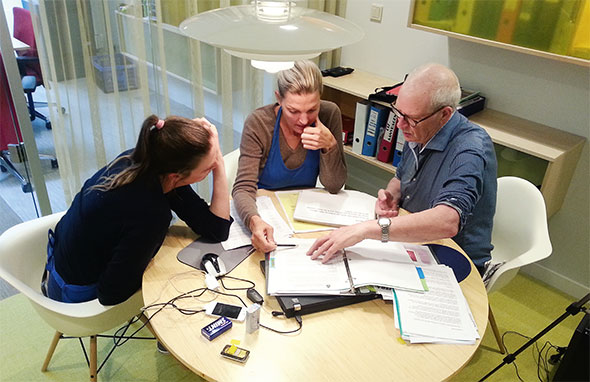
BACKGROUND
De Waterheuvel is based on the Clubhouse Model (an evidence based approach registered in SAMSAH Register of Evidence Based Practices in the USA). Sometimes it is called “Fountain House Model” after the name of the first clubhouse in the world (Fountain House New York). The model had its origin in New York in 1948. A group of people, released from a psychiatric hospital came together as a self-help group, got a building from a wealthy and involved lady and developed the Fountain House Clubhouse. Later staff was introduced and an organisation structure was set up. Members are still part of the board.
TARGET GROUP AND OBJECTIVES
The Waterheuvel is a clubhouse in Amsterdam, serving as a meeting-place and safe place for people with a psychiatric background. It offers an opportunity to meet people, to enjoy friendships and to do meaningful work. By becoming a member, one makes a commitment to the clubhouse. The starting point is a solid confidence in the healthy parts and capacities of each member and the fact that everyone can be a productive worker. The surprising effect of the clubhouse model is the explicit non-therapeutical approach, which has therapeutic consequences. Clubhouse members gain self-confidence, mainly because they are consistently treated as an equal person and not as a patient.
The clubhouse philosophy implies that valuable relations with others are instrumental in regaining self-confidence and respect for oneself. In De Waterheuvel there are countless opportunities to form relationships with other members or staff; for example when co-working on a task, but also during the informal lunches, or the social and educational activities.
METHODOLOGY/APPROACH
The Clubhouse Model is a comprehensive and dynamic programme of support and provides opportunities for people with severe and persistent mental illness. Each individual is welcomed, wanted, needed, and expected each day and is considered a critical part of a community engaged in important work. A core component of the programme is the "work-ordered day," the structure around which daily activity is organised. The dayto- day operation of the Clubhouse is the responsibility of members and staff, who work side by side in a rehabilitative environment. Other core components include transitional, supported, and independent employment through which members can secure jobs at prevailing wages in the wider community; access to community support, such as housing and medical services; assistance in accessing educational resources; "reach-out" to maintain contact with all active members; participation in programme decision-making and governance; and evening, weekend, and holiday social programmes. Clubhouse participants are called "members" and not "patients" or "clients" and all activities focus on their strengths and abilities and not on their illness. The Clubhouse is unique in this approach, as there are no clinical aspects involved in the programme. All members participate on voluntary basis and the clubhouse offers a life-long membership.
PRACTICAL IMPLEMENTATION
De Waterheuvel is a clubhouse, in which all activities are organised and carried out by its members working side-by-side with staff. The daily attendance is on average 37 individuals (who stay on average 4 hours). The clubhouse has an active membership of 120 persons per month. The house is organised in 2 units in which all the activities are organised: administration, kitchen, reception, cleaning and maintenance, decision making, communication, gardening and the meeting place. These units have their own educational courses, focusing on administrative work, computer courses, communication, development and maintenance of websites and the social media as well as cooking and catering. Furthermore De Waterheuvel offers courses aimed at social skills and provide vocational education (with official diplomas and certificates) in cooperation with the Regional Community College of Amsterdam (50 students per year).
TRANSFERABILITY
There are no empirical studies from the Netherlands available which prove that the clubhouse model is effective for other target groups as well, but the model itself can be used as inspiration and overall principle for other disadvantaged target groups. The clubhouse model has been implemented in many different countries and nowadays there are more than 300 clubhouses worldwide (80 in Europe). Clubhouse International and Clubhouse Europe are providing support and guidance.
WHY IS IT SPECIAL?
The clubhouse model is a client-driven initiative, truly based on the abilities and the needs of the target group.
CONTACT AND FURTHER INFORMATION
- De Waterheuvel
Sarphatistraat 41
1018 EW Amsterdam
Telephone: +31 20 – 626 46 42
Fax: +31 20 – 63 88 551 - ➜ info@waterheuvel.nl
- ➜ www.waterheuvel.nl
- Facebook: De Waterheuvel Amsterdam
Health Cultural
CULTURAL ACTIVITIES – A TOOL FOR PEOPLE WITH HEALTH ISSUES, SWEDEN
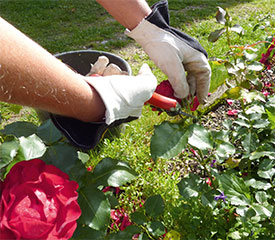
ABOUT THE PROJECT
With a salutogenetic perspective of the patient and a focus on patient empowerment, the regional health care system, in cooperation with cultural institutions and cultural professionals, offers patients a complementary method for better health. The project is implemented by the unit for Heath Analysis, Centre for Healthcare development, Region Oestergoetland. It started 2012 and is ongoing.
TARGET GROUPS
The target groups are patients within the health care system diagnosed with stress, anxiety and depression, an increasing population who urgently needs new methods for wellbeing. The activities are voluntary and prestige-less. It is important to point out that the activities are not therapy, as the cultural institutions are no medical experts.
METHODS AND IMPLEMENTATION
The participants in the project have been informed and offered a chance to participate through the health care system. Each year a rich variety of cultural activities are offered; choir singing, dancing, garden work, art work, literature etc. The activities take place as group activities and are based on a set numbers of meetings. The programmes have varied through the years, depending on which cultural professionals or institutions are involved at the moment. The cultural providers are funded by the Region Oestergoetland for their engagement and a small fee, a couple of Euros, are also paid by the participants, mainly for coffee at the also important coffee break during the meetings.
It´s important for the participants to be in their own creative process without requirements, and that the creating is pleasurable, experimental and reflective without performance requirements. This favours the individual’s well-being, and strengthens their self-confidence. The social aspect of meeting others is equally important. The leader´s role is to be encouraging, supportive and responsive.
WHY IS IT SPECIAL?
Evaluation has shown that all involved, both patients, health care professionals and cultural providers are very pleased with the activities and the outcome is clearly visible. The patients report the positive significance of the content itself, the creativity and joy the activity brings but also stress positive outcomes as social inclusion, finding new tools for change in behaviour and patient empowerment. The project gives patients the opportunity to improve their psychological health with small means and the opportunity for cultural institutions to expand and develop their activities. Some of the participants have even started to work after a long absence from work.
CONTACT AND FURTHER INFORMATION
Skåne for a rear view
ENHANCE PARTICIPATION OF PEOPLE WITH MENTAL ISSUES IN CULTURAL ACTIVITIES, SWEDEN
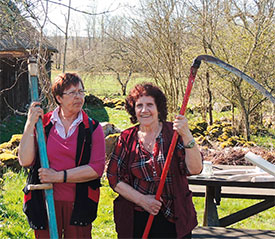
IDEA OF THE PROJECT
The study organisation Bilda and the cultural centre Sofia Kulturmoetesplats have created a project to enhance the participation of people with mental health issues in cultural activities related to local communities, history and folklore, together with local folklore societies, community centres and local arts- and craftsand homestead museums in the southern part of Sweden. The project is funded by the Swedish Inheritance Fund. Bilda Study organisation is built on Christian values and offers a wide range of courses within informal adult education but with the emphasis on vital questions. The organisation is open to people of different cultural background, faith and circumstances. One part of Bilda´s work is the meeting place Sofia Kulturmoetesplats situated in Malmoe, the third biggest city in Sweden, in the very south of the country.
TARGET GROUP AND GOALS
Sofia Kulturmoetesplats offers meaningful occupation for people with mental health issues. The goal is to help isolated people to be able to take part in society on their own terms but with the prospect of finding education or job in the future. The meeting place, Sofia, also promotes participation in the local cultural life and offers possibilities to go to the cinema, the theatre, concerts and exhibitions with a reduced prize.
IMPLEMENTATION AND WHY IT IS SPECIAL
In the project Skåne from a rear view contacts where made with folklore societies and small local museums, all run by volunteers, in the region of Skåne. The participants were going on study visits, to lectures, and were also able to look into the archives and collections to learn more about their personal past as well as the history of the society. Sweden has a long history of offering work positions for people with physical and psychological disorders in museums and archives, but this project focused more on the needs of the participants, (although one goal was to find positions as trainees in the local communities), and on helping the volunteers in their work to save the cultural heritage.
METHODS
Participants in the project Skåne from a rear view where mostly recommended by staff from the health department in Skåne region, but to participate was always on voluntary basis and free of charge. Skills developed by the participants were cognitive, interaction and social skills, as well as improving self-confidence. The participants in the project have, together with professional trainers, written a book about the history of Skåne. It was published in April 2015, but only in Swedish.
CONTACT AND FURTHER INFORMATION
Amici per la strada – friends on the street
INTEGRATION OF HOMELESS PERSONS AND DRUG USERS, ITALY
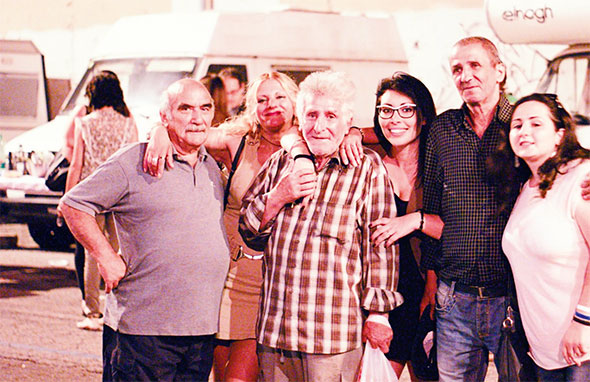
ABOUT THE PROJECT
The project has been in operation since 1980. It has been activated by the community of Saint Egidio, a no profit company that in Italy and in other countries in the world, has for many years carried out interventions of reception, assistance and reintegration of people with social problems. Amici per la strada, specifically, is a project that moves in two main directions: accompaniment of a person into a gradual pathway of reintegration, and support and protection to a better quality of life.
TARGET GROUP
The target group is represented by individuals that are alone, without family or other kinds of relationships. That condition is common with all the homeless people who suffer as well from many other problems such as mental illness, alcohol and drug issues. Many of them are ex-offenders and almost all of them come from families with serious social, cultural, and economic problems. Most of them are foreign and there is an increase in the number of Italians. The foreign are represented by irregular immigrants, new immigrants, or regular immigrants, but unemployed and without any other kind of sustaining factor. The target group is heterogeneous, composed of people who are alone and homeless: older aged people, disaffected youth, depressed immigrants, the new poor.
AIM
The main aim of the project is to take care of persons marginalised that don’t know, in most cases, what, and how many rights they have. The public institutions are not always prepared and available to answer to the needs of those people. The aim is to fill a lack and deficit of support and supply focused interventions.
METHOD/APPROACH
The approach used is that of mutual help that moves people from being marginalised and excluded to a place in the centre, and modifies the passive condition of the users with new opportunities and resources.
Amici per la strada provides in a transversal way distribution of food and clothes and health assistance, but also information and listening services about specific needs and requests. Thereafter, the project tries, in a focused way, to give help in finding accommodation and work. This type of intervention that needs planning for the medium/ long term and a better knowledge of the users, is aimed at enhancing their personal skills.
IMPLEMENTATION
Even if the project methodology is not really innovative, it is able to implement solutions and services more specific and focused to the different groups that compose the heterogeneous category of homeless people. The regeneration capacity of the project – related also to the support of the overall organisation that is able to achieve several important milestones during the years – is even showed by the diffusion of results into the national territory (in Liguria, Campania and Veneto Regions) and in many poor countries of Africa.
WHY IS IT SPECIAL?
Meanwhile the project is special because in recent years it has helped a lot of people considered alone and poor, producing good results enabling social reintegration and the overcoming of addiction and exploitation situations. This project is also special because it has been able to solve a lot of uncomfortable situations related to carelessness, lack of assistance and comprehension. In this way, the first level services (food, clothes, medical care) creates a virtuous circuit based on listening and comprehension that breaks through material and mental obstacles, and makes it easier to get out from the isolation and loneliness conditions.
CONTACT AND FURTHER INFORMATION
- Comunità Sant’Egidio
Via di San Gallicano 25/A ROMA
Contact person : Alessandro Moscetta
Telephone: +39 334 8135420 - ➜ info@santegidio.org
- ➜ www.santegidio.org
- Facebook: Comunità Sant’Egidio
The House of Memory
SUPPORTING ELDERLY PERSONS WITH DEMENTIA, DENMARK
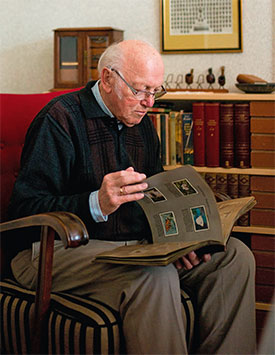
ABOUT THE PROJECT
Since 2004 Den Gamle By Open Air Museum in Århus in Denmark has worked with and developed memory retrieval programmes for elderly people with senile dementia.
IMPLEMENTATION AND METHODS
In small groups people with senile dementia are invited into the “House of Memory” a home with an interior of the 1950s. The "guests" are invited to help in the kitchen with the gas stove and other typical objects from the period, or sit in the living room with a lot of things they can see and touch, things they remember from their childhood and youth. They all are served coffee with cakes popular in the period. The atmosphere is warm and homely, memories are exchanged and the spirits are high.
In this context the visitors who suffer from more or less severe senile dementia recollect memories, they are able to communicate with the others and they participate actively in a social event. The whole visit is an aesthetic experience with high impact on the visitors’ senses and emotions which enables them to use skills and remember things that were forgotten.
AIMS AND WHY IT IS SPECIAL
During the last two years Den Gamle By has also focused on relatives to people suffering from dementia and on care centre staff and has started developing special courses for these groups.
The aim of the project is that memory retrieval should give fragile elderly people a possibility to keep or regain control over their own life, to hold on to their identity and self-worth, to master their lives for a period. The two main elements of the project are 1: To use the museum settings in order to give experiences and substance to elderly people suffering from senile dementia. 2: To contribute to educating the staff as well as private persons, who take care of elderly people suffering from senile dementia.
Since 2004 they have had a steady growth in users, and they also have a growing network (local, national and international) which is inspired by their work and with whom they develop new courses. The response to the project has been good. In 2014 they had in seven months over 90 courses in the House of Memory.
For several years Den Gamle By had contact with other open air museums that have been inspired by the project and have adapted it to their museum. From 2012 to 2014 Den Gamle By have been involved in the EU Grundtvig project Re-active where museums from Hungary, Norway, Sweden, Belgium and England have been introduced to the project and they have discussed best practice experiences and shared ideas.
From 2014 and until 2016 Den Gamle By is involved in the Erasmus + programme “Active ageing and Heritage in Adult learning” together with Jamtli in Sweden, Beamish Museum in England, Szabadtéri Néprajzi Múzeum in Hungary, Lillehammer museum in Norway, LINNEUNIVERSITETET in Sweden and UNIVERSITY OF NEWCASTLE UPON TYNE in England. The aim of the project is to create a methodology with guidelines for how this kind of reminiscence work can be carried out in a heritage setting. Den Gamle By was founded in 1909 as the world´s first open-air museum of urban history and culture.
CONTACT AND FURTHER INFORMATION
Crescere a cores
SUPPORTING COMMUNITIES IN MARGINAL URBAN AREAS, PORTUGAL
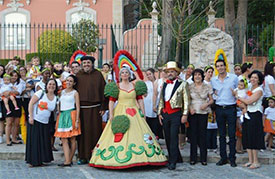
THE PROJECT
The association “Crescere a cores”, founded in 2007, is an institution of social solidarity. The association works in the areas of psychology, education and health in a community prospective. It performs a community and participatory activity, a kind of intervention linked with the concept of proximity to the community, which respects and promotes locally the real meaning of human differences.
TARGET GROUP
The principal target group is represented by children, teenagers, and parents of the Bairro Padre Cruz Community, a suburban area near Lisbon. More accurately the main target group is represented by all the poor and needy families living in the suburban area.
AIM
The main aim of the project is to promote education in a context of pedagogic quality which gives the opportunity to all families to share experiences, to strengthen and to stimulate their own skills and abilities among parental roles and functions, but also the roles of educators and citizens of the community.
METHOD/APPROACH
The approach used is to work on an educational process. A method formed by several levels of work: from the social relation to the active participation of the parents and educators, to the consolidation and promotion of different activities for the improvement of skills and abilities among the parents and having an active citizen role in the local community. After having prepared a diagnosis, an essential intervention is established with the local parents, specifically to create a support service that could sustain and help parents in their educational role and in the prevention of potential problems for the adolescents.
IMPLEMENTATION
The project “Crescer a Core” was founded in 2013 by the triple collaboration between Crescer a Core, Junta de Freguesia de Carniede and the foundation “Montepio” to improve the education of children and pre-adolescents in danger, but especially to reinforce parents’ educational capacities, developing their abilities in real and effective parental role. The project work is performed in a socio-economic context for the poor and needy.
WHY IS IT SPECIAL?
The project “Crescer a cores” is special as it is a fundamental and social answer for the Barrio Padre Cruz, the major and poorest municipal area in the Iberian Peninsula. It is also special as it uses participating pedagogic training, it offers an essential support to a community strategy of cooperative work for the entire population. It is a project that neither supports families materially, nor substitutes itself to parents’ responsibilities, but involves them actively and effectively, making them able to choose consciously a method of education involving first a self-evaluation as a principal model of life for their own children. For those reasons “Crescer a cores”, which means “growing colourfully”, highlights and supports the idea that we are different from each other, such as the different shades of colours.
CONTACT AND FURTHER INFORMATION
- Associazione Crescer a Cores
Rua Rio Tejo n.7 (antiga escola 167) –
Bairro Padre Cruz
Carnide 1600-746 Lisbon, Portugal
Contact Person: NOEMI PARAISO
Telephone: +351 215937851 - ➜ cresceracores@gmail.com
- ➜ www.cresceracores.pt
Hierbabuena
INTEGRATION OF PERSONS WITH MENTAL ISSUES, SPAIN
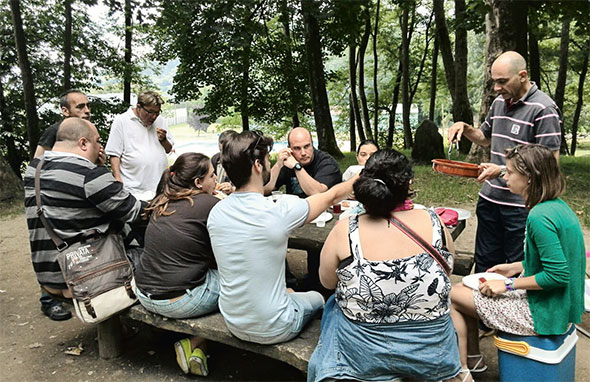
ABOUT THE PROJECT
Hierbabuena is the principal association in Asturia for all the interventions delivered in favour of people who suffer from mental instability problems. It is an association which offers social-sanitary services. It has operated since 2000 and delivers several activities in relation to particular needs of people with fragile states of mind, and with rare pathologies and states of behavioural, relational and working stresses.
TARGET GROUP
The number of people affected by psychological problems is increasing even in Asturia. Mental disorders often cause isolation and social exclusion. One of the most problematic aspects for individuals affected by mental instability is represented by the lack of working opportunities and regular learning. The target group is composed by both individuals with psychological problems and those who succeeded in treating the disorder.
AIM
The main purpose of the project is to develop actions and activities in order to promote integration, improving knowledge, socialisation for people with mental problems or for people who have suffered with mental problems. The activities are realised by highly qualified, professional members of staff, who are able to provide services for all with a particular attention dedicated to the issues of each beneficiary, keeping a coherent pathway of activities according to the specific characteristics, particular pathologies and issues of every patient.
METHOD/APPROACH
The approach of promoting the social participation is used, assessing needs starting with the social ones, followed by the clinic ones. The interdisciplinary and participatory planning working method is based on the necessity of solving social problems, which often tend to remain unsolved. The method keeps the perception of problems in a level of priority for users, as well as for social-sanitary operators.
For this reason, the project methodological approach links the importance of the total psycho- physical recovery of the individuals with mental problems to a series of support actions: information, guidance and transfer of competencies and skills, the integration of the beneficiaries, and highlights mental health problems to increase awareness and respect to the so called “outside world”.
IMPLEMENTATION
Over a few years the association activities were able to assure their services in different cities of the Asturia’s region, namely in Aviles, into the Social Centre of Arbolon, in Oviedo into the Santullano Association and in Gijon into the same social- health association.
WHY IS IT SPECIAL?
The project is special because it assures an empathic, specific and focused attention to people with mental illness, more than simply and strictly health assistance. It’s special, moreover, because it takes care of people beyond just mental pathology, providing services that stimulate cognitive and learning abilities in beneficiaries, giving them a meeting place, share of experiences and relations, learning of technical competencies and awareness of having specific abilities and skills. And last, the project is special as a significant experience against stereotypes and clichés of people with mental diseases.
CONTACT AND FURTHER INFORMATION
- Centro Municipal de Asociaciones EL ARBOLON
Avenida de Gijon ,5 -33400 Aviles, Asturias, Spain
Contact Person: Dott.ssa Liliana Fernandez Gonzales
Telephone: +34 635829878 - ➜ hierbabuenagijon@hotmail.com
- ➜ www.associationhierbabuena.org
- ➜ es-es.facebook.com/A.HIERBABUENA
RADE Ltd. – Recovery through Art, Drama and Education
COUNSELLING, THEATRE AND ART FOR PEOPLE WITH MENTAL ISSUES, ESPECIALLY FORMER DRUG USERS IRELAND
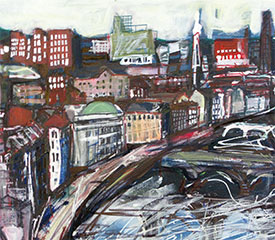
ABOUT THE PROJECT
RADE’s purpose is to help to improve drug users’ quality of life and address their sense of isolation and boredom through the use of cultural activities that are plausible and attainable. These activities afford RADE participants the space to demonstrate their capacity to contribute to society, and challenges the stereotypical impression that society has of drug users.
The project provides a service for mainly ‘low threshold’ service users to engage with drug recovery initiatives including counselling and relapse prevention workshops. Most of the service users of RADE have been early school leavers. RADE uses theatre and art activity to improve well being and life outcomes. Core life skills such as: literacy, self-confidence and team work are all outcomes that are evident in the participants who engage on a daily basis with the programme. The ensemble approach to all of their workshops allows for peer support. RADE facilitates numerous contemporary artists to provide training for service users. Outcomes include annual public art exhibitions, creative writing publications, and specially commissioned theatre plays/films/dance for participants to perform.
IMPLEMENTATION/TRANSFERABILITY
Elements of the RADE model have been adopted by a number of services in Dublin and Ireland. They have also had a number of visits from individuals and agencies from Europe including Portugal, Greece, Finland, UK, France and USA. This model is dependent on funding through granting agencies, local government, and/or a fee paying system for agencies referring clients.
WHY IS IT SPECIAL?
The teamwork and interdependent nature of public productions competes with the passive stimulation experienced by drug-taking and helps to promote self-education, -confidence and self-esteem. This helps to ensure a whole range of learning and gained experience that comes with the territory, whether it is development of literacy skills through playwriting/reading or technical skills achieved through realising productions in theatre, film and art. Positive life style changes and decision making is relevant and beneficial to any target group particularly those deemed disadvantaged or excluded. Participants exploring and undertaking changes which result in improved opportunities in education and employment are to be encouraged. The increase in self-confidence, self-esteem and the development of communication and assertiveness skills allow participants to consider making changes to their drug using which can result in better health, improved family relationships and often the opportunity to move away from criminal behaviour and settle into more stable accommodation. RADE has advocated on behalf of service users to access drug detox, accommodation, courts appearances, accessing medical cards and further training and work experience placements.
CONTACT AND FURTHER INFORMATION
- Michael Egan – Director
- ➜ michael@rade.ie
- ➜ www.rade.ie
Jackdrum: Reach your Potential
ADULT AND COMMUNITY LEARNING PROJECT FOR PEOPLE WITH LEARNING DISABILITIES, UNITED KINGDOM
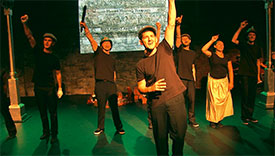
ABOUT THE PROJECT
Jack Drum Arts seeks to engage individuals and communities in creative explorations using a wide range of performing arts and media. The idea is that creativity works on lots of different levels, offering people of all ages and abilities the opportunity to discover new things about themselves and their place in the world.
The Adult and Community Learning Programme has been devised to fit the needs of adults with learning disabilities and all the courses work towards a festival about Dignity. The courses are music and songwriting, filmmaking and digital storytelling. The sessions are empowering and learner centred ensuring that everyone feels ownership and can work at a pace that is suitable for their own ability.
The target groups include people suffering from mental health problems, adults with learning or physical disabilities, and the long term unemployed. In addition they work with a blind and partially sighted group of learners to help them tell their stories to make a film which looks at the challenges of living with sight loss. Although the learners themselves can't physically make the film they are able to drive the content and are in control of the final edit, what the story was actually about, and how it was told.
IMPLEMENTATION/TRANSFERABILITY
This type of work could be easily transferred to another country if artists were available and interested in working with this client group. Some training in working for this client group would need to be provided for the artists. The programme could be added to existing provision for adults with learning disabilities.
Jack Drum Arts is resourced through both grant funding and local government contracts. Ideally someone starting this type of programme would look at local government funding and contracts as a starting point, or join forces with an organisation already delivering to this client group.
WHY IS IT SPECIAL?
The successes of the projects are the enjoyment that learners get in achieving artistic outcomes above and beyond what is normally expected of them. The organisers strive for high quality in all their work and ensure that their learners are placed with highly skilled artists who support them in achieving to the best of their ability. The project is empowering and improves the health and emotional wellbeing of all those who take part. Creating together gives the participants much more confidence in themselves and a great sense of achievement which they take forward into their day to day lives.
CONTACT AND FURTHER INFORMATION
- Helen Ward, Managing Director
Telephone: +44 1388 765002 - ➜ helen@jackdrum.co.uk
- ➜ www.jackdrum.co.uk
Making Connections
LEARNING EXPERIENCES FOR ADULTS WITH SUBSTANCE RELATED MENTAL HEALTH DIFFICULTIES, HOMELESS PERSONS, IRELAND
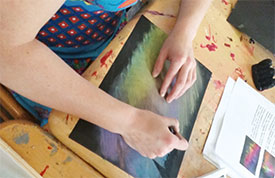
ABOUT THE PROJECT
MCST has been in operation for 5 years in Clonmel, Co.Tipperary, Ireland and is aimed at those who have become disconnected from mainstream services. It is a stepping stone back into education by offering small group classes and 1:1 when required to those who are not ready for mainstream education. This programme offers the learner a re-introduction to adult education where they receive valid certification for their efforts.
The programme works with adults with experience of substance misuse/alcohol and/or homelessness and/or substance related mental health difficulties. The programme originated in Waterford City over 10 years ago as a response to the educational needs of people who were homeless , originally 1:1 training once a week, with a focus on life skills, cooking skills. Now the funding requirements require more focused outcomes, namely QQI (Quality and Qualifications Ireland) certification and progression to either further education or training.
The project operates from a community centre and town that is well resourced with drug counsellors, community based drugs workers, probation services, women’s refuge, homeless services, mental health services, etc. The learners are referred from these services that offer backup and support while the learner is engaged on the programme.
IMPLEMENTATION/TRANSFERABILITY
Currently “Making Connections” operates in 3 counties in Ireland (South Tipperary/Waterford/ Carlow). The project has the potential to be rolled out in other countries once it was based in a community setting, in a well resourced training centre with the right tutors and management structure. This type of service could tie into local government contracts or potentially set up within a partner organisation from where referrals can be made.
WHY IS IT SPECIAL?
Operating under the same roof as other agencies means the learner has a high level of support. MCST endeavours to source additional support for learners to assist with their substance misuse related issues and have developed a working relationship with a wide range of services.
MCST has a high level of engagement and has seen learners grow as individuals and beginning to believe in themselves. All who continue to engage with the programme receive certification upon completion of each module (must complete 7 modules for a Major Award) and some have progressed to further education and the workforce. All of the above aid in recovery by building confidence and well being of individuals. MCST has many success stories, such as a learner who wanted to become a hairdresser and is now working in a local salon on an internship.
CONTACT AND FURTHER INFORMATION
- Jenny Ryan, Co-ordinator Making Connections
South Tipperary
Mobile: +353 86 771 6289 - ➜ mcsouthtipperary@wstcys.ie
- Sponser Organisation: Waterford and South
Tipperary Community Youth Service
Funder: Waterford and Wexford ETB - ➜ www.wstcys.ie
Biblioteca la Conca
SUPPORT FOR PEOPLE WITH MENTAL ISSUES IN A LIBRARY CONTEXT, ITALY
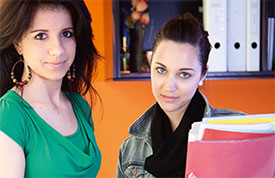
THE PROJECT
The project was started in 2002 in the field of rehabilitation by the department of mental health of the San Paolo Hospital of Milan, from an idea of an educator and one user of that service. Through the years the “Biblioteca la Conca” has been enhanced with project making facilities, commitments and resources. The project is now based on a precious network of entities, associations, universities, but above all, public libraries in the municipality of Milan. Briefly, it consists of a little therapeutic activity addressing to the users of the Day Centre.
TARGET GROUP
The target group consists of adult individuals, hospitalised in the centre of mental health in the San Paolo Hospital of Milan, who need care and rehabilitation related to different forms of mental illness. In the first stage of the project, the target group was composed of patients with mental diseases that, if not properly assisted, would compromise more and more of their autonomy with a high risk of illness chronification and social exclusion.
AIM
In Milan, the meeting points for socialising and caring for individuals with such illness, or for learning possibilities for adult people living in the situation of fragility and mental illness, are closed and protected places, without the presence persons from outside. The most important aim of the project is working on mental discomforts through moments of socialisation, sharing time, the reading of books beyond the relationship patient-doctor. The aim is to activate productive relationships with the patients and on the whole welcome the challenge of connecting illness and rehabilitation pathway.
METHOD/APPROACH
The methodology used in the project activities is strictly related to the education relationship. Through this kind of formal and informal education, as watching movies and reading books, suitable welcome, care and listening processes can be realised. The attitude of the health/educational operator is not simply that to receive the complexity of this discomfort, but also and above all to stimulate and reactivate relationship, emotional and cognitive abilities of the patient.
IMPLEMENTATION
To support and increase the project allowing this development, the cultural association “Alziamo il Volume” was created to have the aim of promoting projects, of consolidate and upgrade services already available. The aim is to strengthen the role of the Library in the municipality of Milan, and have a deeper exchange with the territory.
WHY IS IT SPECIAL?
This project is special because through all the activities carried out, the patients have learnt abilities and skills useful to have successful relationships with the library users, to loan books, to catalogue books and provide all the secretarial duties and tasks. The project is special because it represents a successful new pilot methodology in the field of prevention, care and rehabilitation. Still today the patients benefit from the rehabilitation pathways, observation traineeships or empowerment courses, to achieve a good level of personal autonomy, social and professional integration.
CONTACT AND FURTHER INFORMATION
- Dipartimento di Salute Mentale dell’Azienda Ospedaliera
San Paolo (Milano)
Contact person: Dott.ssa Barbara Bortolini e Dott.ssa Claudia Giangregorio
Telephone: +39 02 81843304 - ➜ biblioteca_laconca@libero.it
- ➜ www.comune.milano.it
- Facebook: La Conca Biblioteca
Young in Prison
INTEGRATION OF YOUNG OFFENDERS, SWEDEN
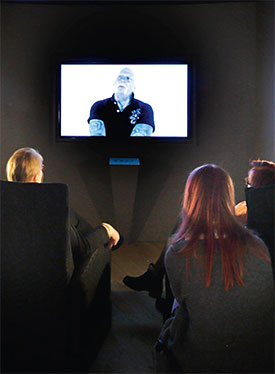
BACKGROUND
About 200 people, aged 18-21 years and mostly young men, are admitted to Swedish prisons each year. The everyday news tells us some info about their crimes, court hearings and the judges but rarely write anything about the human behind the headlines. Early school leavers, bullying, unemployment, social exclusion and financial difficulties are common among persons who fall into crime. Many have or get an ADHD diagnosis while in prison.
TARGET GROUP
The Museum of Work, Agency correctional treatment in Sweden, and the National Association Attention for ex criminals decided to let young inmates talk about their lives and turn their stories into a travelling exhibition. The project was made possible through funding from the Swedish Inheritance Fund. For the museum this was a new focus group to work with. Arbetets museum- The Museum of Work- is a meeting place for all senses. It opened 1991 in an old cotton mill in the former industrial area in Norrkoeping, Sweden. The museum depicts working life and working conditions through exhibitions, seminars and pedagogical programme activities. The goal of the museum is to be an innovative meeting place, which promotes discussion on peoples work, lives and conditions and have been renewed for its work with various focus groups.
IMPLEMENTATION
In January 2014 young inmates at the prison in Luleå, in the north of Sweden, started to discuss how they can make an exhibition with staff from the Museum of Work. They shared their stories about their lives and about feelings of being locked in. Other young inmates at other prisons and detention centres also participated by sending in their life stories, guided by their own teachers in the wards. In total 25 young inmates participated in the work of creating a travel exhibition.
Why is it special?
The exhibition opened in January 2015 at the Museum of Work and will go on tour to six different places in Sweden, the estimated public attending is about 100 000 visitors. At each place a young ex-criminal will be offered a working position as a guide in the exhibition for four months. In this way the project partners hope to help counter prejudices and promote greater openness for people being convicted and also raise awareness about people with neuro-psychiatric disabilities as well, as on a personal level, help ex cons to start all over again.
METHODS AND GOALS
Skills developed by the participants where both cognitive, interaction and social skills, physical and learning skills, as well as better self-confidence. Hopefully the exhibition also will be seen as a tool to work with greater competence in treatment of young adult criminals and help them start on a path towards education and jobs.
Along with the exhibition the museum will also produce a book (2016-17) explaining the methods used with a collection of not only the inmates life stories but also stories of the staff working in prisons. The book will be in Swedish.
CONTACT AND FURTHER INFORMATION
Inspire-Adult Programme
EDUCATIONAL, THERAPEUTIC AND LEISURE SERVICES FOR DISABLED PERSONS, MALTA
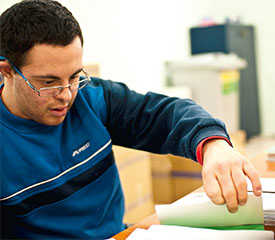
ABOUT THE PROJECT
“Inspire” believes that everyone has a right to equality and inclusion. The mission is to try to help everyone with a disability achieve this. They do this by providing individuals and their families with educational, therapeutic and leisure services all under one roof. Through COMMUNITY INVOLVEMENT and INDEPENDENT LIVING SKILLS TRAINING the programme aims at providing persons with disabilities opportunities for integration into the community and better quality of life through age appropriate physiological, social, recreational, domestic and self care activities.
This is an ongoing programme of independent living training, combined with employability skills training and job coaching. These skills are always relevant. Employability skills training supports the social and professional inclusion of people who have difficulty accessing the labour market, by providing the necessary vocational training. Inspire acts as a strategic partner for employers, families, and other social actors, promoting the quality of life at work. Clients start their training by following general courses aimed at enhancing their skills and increasing their effectiveness at career exploration, whilst assisting them in making realistic vocational choices. Inspire also advocates for inclusion, educates the general public, raises awareness among peers, and holds the best knowledge base on disability in Malta.
IMPLEMENTATION/TRANSFERABILITY
The key to the success of this model is its holistic nature. To transfer this model you would need to have access to all aspects of disability service in one location. By creating this sort of model chances are increased of securing local government contract funding for services to the disabled. Inspire receives 50% funding as government contracts and other service agreements, 34% from fundraising and donations (including commercial activities), 16% from other sources - including EU funds, and fees. A similar mix would likely be needed if starting up elsewhere.
WHY IS IT SPECIAL?
The very holistic approach that “Inspire” uses allows its clients to develop in many ways combining life skills and improved well being with employment and education outcomes.
The Inspire Foundation is the result of the Merger between the Eden Foundation and Razzett Tal-Hbiberija – two leading charities that worked in the field of disability. The two organisations transferred all their resources and employees over to the new foundation, which now provides all the services in a one-stop-shop model avoiding duplication, enhancing service delivery with a holistic, person centred approach. It is more cost effective, leading to long term sustainability and added value.
CONTACT AND FURTHER INFORMATION
- Paula Doumanov, Chief Services Officer
Telephone: +356 2189 0000
Fax: +356 2180 7708 - ➜ paula.doumanov@inspire.org.uk
- ➜ www.inspire.org.mt
Ability not Disability in workplace
GUIDANCE FOR EMPLOYERS IN HIRING PERSONS WITH SPECIAL NEEDS, LATVIA
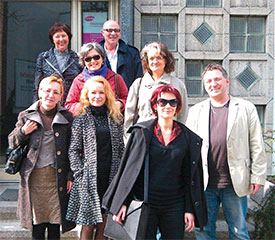
ABOUT THE PROJECT
The Project “Ability not Disability in workplace (AnDiW)” contributes to the development of a very important issue – employment of people with disabilities. The project addresses not only reducing unemployment and fighting against social exclusion, about practical implementation of the United Convention on the rights of Disabled People, but also about an important barrier – the opinion of employers on disabilities and abilities, their lack of experience, information and motivation, and the existing view: “Why I must hire disabled if I can hire non-disabled?” The project was implemented by five institutions in four countries: Germany, Italy, Latvia and Lithuania. The first original project was worked out within the framework of the Leonardo da Vinci project “Ability not Disability in Employment” (2003-2005, AnDE), which was presented with a quality prize and further developed and adapted within two Leonardo da Vinci transfer of innovation projects: “Increasing Employability of Disabled People” (2008-2010).
TARGET GROUP
The project addresses people with disabilities.
AIM
The main aim of the project is to decrease the discrimination of people with disabilities in employment, and to develop employers’ (managers' and trainers') competences and skills offering them a modern and useful distance education course and methodical materials.
METHOD/APPROACH
The distance education course was created to be a contribution for existing entrepreneurs and managers in different sectors of the economy, as well as for students of study programmes in Business Administration and Human resources management, who directly or indirectly participate in the recruitment and employment of people with disabilities.
IMPLEMENTATION/TRANSFERABILITY
The project can easily be transferred to another region/country and adapted by another institution and implemented as a transfer of innovation into new projects. Available on-line are various materials of the project, i.e. distance education course, trainers’ notes. All material is available in English, German, Italian, Latvian, and Lithuanian.
WHY IS IT SPECIAL?
Distance Education course is flexible and may be of use to staff, the specialists of state and municipal institutions, mass media and for those working in the field of social inclusion. Project material gives a comprehensive insight into employment and the integration of people with disability in the workplace, and includes analytical reviews, survey results on managers’ perception of the integration, and employment of disabled people which was carried out in Germany, Italy, Latvia and Lithuania and cases from other European Union countries.
CONTACT AND FURTHER INFORMATION
- Mrs Marga Zivitere
- ➜ marga.zivitere@isma.lv
- ➜ www.andiw.isma.lv/
Copyright 2015 team training - Webdesign: Thomas Penka | Impressum und Datenschutz






